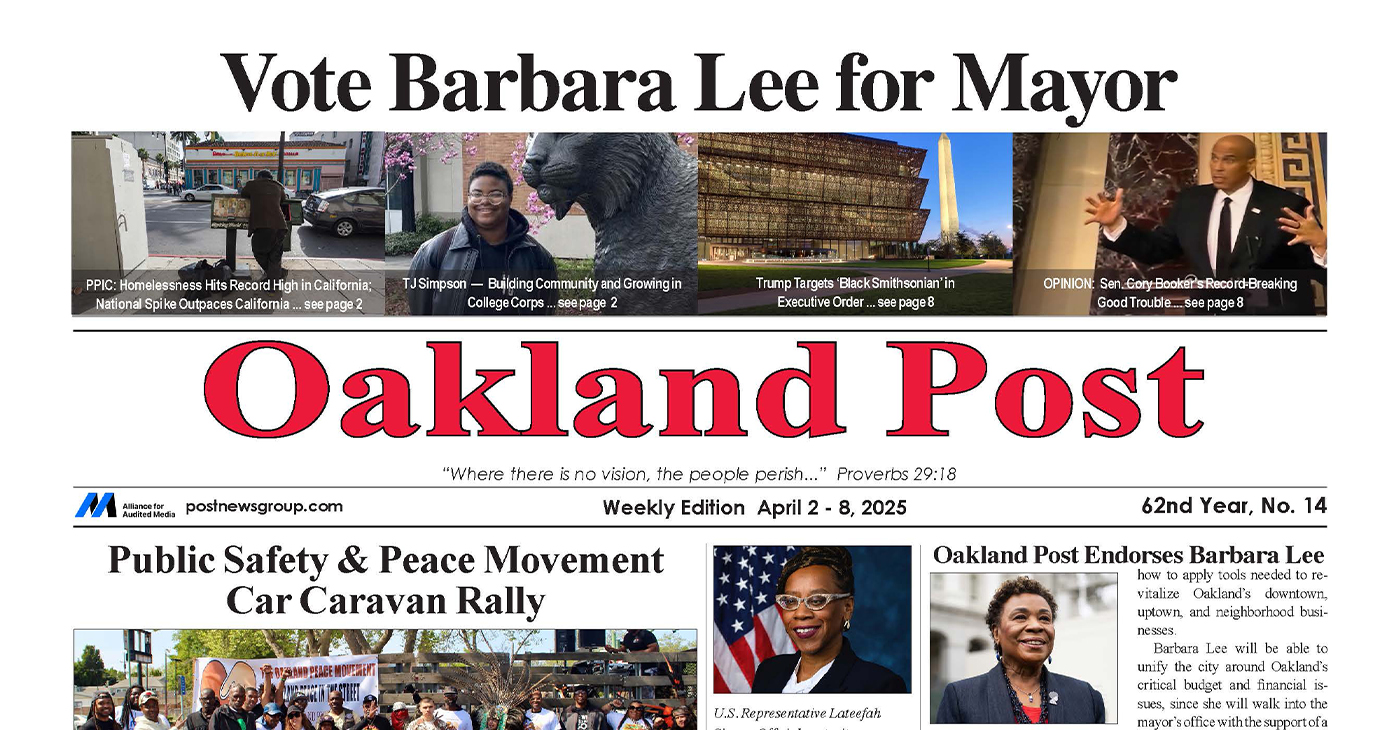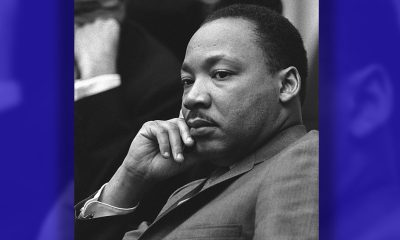Community
Manhood conference focuses on mentors, power of forgiveness
WAVE NEWSPAPERS — The critical need for male mentors, the importance and power of forgiveness and how to heal from violence and sexual abuse were just a few of the topics discussed April 27 during the third annual Manhood Conference held by the nonprofit Positive Results Corporation. “Our goal is to engage men and boys to increase awareness of dating, domestic violence and sexual assault while being proactive in ways to prevent it,” said Kandee Lewis, executive director of the organization that sponsored the conference at the Douglas F. Dollarhide Community Center.
COMPTON — The critical need for male mentors, the importance and power of forgiveness and how to heal from violence and sexual abuse were just a few of the topics discussed April 27 during the third annual Manhood Conference held by the nonprofit Positive Results Corporation.
“Our goal is to engage men and boys to increase awareness of dating, domestic violence and sexual assault while being proactive in ways to prevent it,” said Kandee Lewis, executive director of the organization that sponsored the conference at the Douglas F. Dollarhide Community Center.
Boys and young men from the ages of 10 to 24 gathered for a day of talking, listening and healing.
“Big” John Harriell, the keynote speaker and the diversity manager and superintendent for Morrow Meadows, an electrical and data communications contractor, emphasized the importance of fathers. Harriell said that many boys lack a father figure to look up to.
“The absence of a father in the home can be detrimental to a young man or a woman,” he said. “Without that guidance, the children could do things that are counterproductive to themselves, their family and the community.”
Harriell, who grew up in a home filled with domestic violence, said he went down the wrong path as a youth. It was only after he did a stint in prison that he was mentored by other inmates — “father figures” who taught him how to be a provider, protector and leader.
On a Consent, Abuse and Other Conversations panel, featured speakers included community advocate Dustin Baker;Harriell, and Terry Boykins, CEO of Street Positive, a company that assists youth impacted by adverse childhood experiences. Donta Morrison, program manager at APLA Health, served as the moderator.
“How many of you young men have had a conversation about sex?’ Morrison asked the audience. Only a handful of young men raised their hands.
The panelists warned that young men who are not knowledgeable about sex could contract sexually transmitted diseases or be faced with an unwanted pregnancy.
“Please have that conversation with your parents or guardian,” Morrison urged.
Sexual abuse was also a topic of conversation.
“An adult engaging in sexual activities with a child is wrong and needs to be held accountable,” said Boykins, who added that sexual consent should occur between two adults, not with children.
Baker warned youths about predators.
“There are a lot of men who get molested by women like the babysitter,” Baker said. “Or teen boys who are seduced into sexual activity by their teachers.”
Baker shared his own experience.
“I was 15 and I was secretly struggling with my sexuality,” he said. “One day, this adult who was 30 years old and a mentor of mine leaned over and kissed me. I thought, ‘I was dirty, I was wrong.’ I was confused because my sexual identity was still being developed.”
He said he was coerced into embarking into a sexual relationship with the mentor.
“I wanted to instantly go back to being a teen, but I couldn’t,” Baker said.
Morrison confessed that he was also sexually molested at the age of 8.
“I told my father, but he called me a liar,” said Morrison, who was traumatized by the incident. “I didn’t tell anyone else about the abuse until I was 29 years old.”
Morrison added that every day, he tests young men at APLA who are stunned to find out that they are HIV-positive because they didn’t practice safe sex.
A young man raised his hand and asked, “If we’re in school and the principal touches us in a strange way, can they go to jail?”
“That’s a very good question,” said Boykins, who quietly passed the boy’s confession on to probation officers listening in the room.“Young people, if someone is touching you inappropriately, tell an adult you trust. When someone is a predator, you are probably not the first victim he has done it to.”
“Our culture says, ‘Don’t snitch,’” Baker said. “But you have to tell someone if you’ve been sexually molested because the trauma will affect you well into your 30s and 40s.”
“Remember, ‘if someone approaches you sexually, tell them ‘no’ means ‘no,” Harriell said.
The Importance of Mentorship featured Arturo Flores from the Big House,Dillon Iwo, senior field representative for U.S. Rep. Karen Bass; and Torrence Brannon Reese, CEO of F.A.M.L.I., a mentoring program for at-risk youth. The panel was moderated by Los Angeles County Fire Capt. Brent Burton.
“Where can a young person find someone to help them grow and develop?” Burton asked.
“A mentor can be anyone who can provide a level of guidance for you,” Iwo said. “Mentors can be people we aspire to be like in various aspects of our lives.”
“You can find mentors at the Boys and Girls Club or at church,” Flores said.
“It’s not hard to find people for inspiration,” said Flores. “Be tech savvy. You can find or read about mentors on Google, Instagram, Facebook and Snapchat.”
Reese added that youths can also find mentors in books.
“Books saved my life,” he said. “My mother gave me ‘The Autobiography of Malcolm X’ when I was 10 years old. He and Muhammad Ali became my mentors.”
“If you know someone you admire, be confident enough in yourself to ask them, ‘How do I make it out here?’” Iwo said. “Your mentor could be someone you are connected to spiritually or even in a book.”
“Be the best that you can be and you will attract mentors,” Reese said.
During a break, the room turned lively as the men showed the youths how to properly tie a tie — considered a definitive rite of manhood.
The third panel, Healing and Forgiveness, featured speakers Shontez Williams of Back to the Basics, gang interventionist Ben “Taco” Owens and pastor of Hope in Christ Community Church Ed Robinson.
“I am a survivor,” said Williams, who spent 17 years in prison. “I have to live on for my daughter who was killed by another female. My friends were upset. They told me, ‘Man, somebody should have her killed.’
“But I made calls from prison and told my crew not to touch the young lady or her family,” Williams said. “My healing and forgiveness came when I forgave.”
“My stepfather used to beat my mother,” said Ben Owens III, who was angered by the abuse and joined a gang at an early age. “When I got out of Los Angeles County Jail at 18, I asked myself, ‘Where was my real father when I was going through these challenges?’”
Owens tracked down his father in Alabama and found out that he was mentally disabled.
“I was holding a grudge against him for years that he didn’t have any control over,” Owens said. “I forgave him. That forgiveness changed my life.”
Robinson said that he also grew up in a home filled with domestic violence.
“My father was an alcoholic and he beat my mother. One day he approached her with a butcher knife. But at 13, I was an amateur boxer and I was ready to fight him. When he tried to beat my mother, I said, ‘No, not today.’” He stopped in his tracks.
“I forgave my father,” said Robinson, who forged a strong bond with his dad during the last three years of his life. “Not forgiving someone will destroy you physically,” Robinson said as he poured a sack of rocks on the table.
“We have a choice to release that bondage, pain and hurt or be weighed down with hate and anger for the rest of our lives,” he said, pointing to the rocks.
Sociologist Tre Watkins concluded the conference by holding a “healing circle.”
“Do your best every single day,” he urged the youths. “Repeat these words: ‘I am strong, I am powerful, I am intelligent and I am worthy.’”
“We need men to set examples for us,” said Abel, who stood up to speak. “If you see us young people going down the wrong path, show us how to go down the right one.”
This article originally appeared in the Wave Newspapers.
#NNPA BlackPress
Lawmakers Greenlight Reparations Study for Descendants of Enslaved Marylanders
BLACKPRESSUSA NEWSWIRE — Maryland lawmakers have approved Senate Bill 587, authorizing the creation of the Maryland Reparations Commission.

By Stacy M. Brown
BlackPressUSA.com Senior National Correspondent
Maryland lawmakers have approved Senate Bill 587, authorizing the creation of the Maryland Reparations Commission. The body will study and make recommendations for reparations to descendants of enslaved people and others harmed by centuries of discriminatory policies. The legislation now awaits the governor’s signature and is scheduled to take effect July 1, 2025. The commission will examine Maryland’s long history of slavery, the economic and social systems that benefited from it, and the lingering impacts of those institutions. Its work will include recommendations on financial compensation, housing and business support, tuition waivers, and other forms of restitution. “This commission is not only about acknowledging our past – it’s about using that understanding to pave the way for a more equitable and fair future,” said Del. Jheanelle Wilkins, Chair of the Legislative Black Caucus of Maryland, which made reparations a top priority for the first time this legislative session.
From its founding in 1634 until the abolition of slavery in 1864, Maryland was a society built on slave labor. Tobacco, the colony’s staple crop, fueled economic growth and political dominance for the state’s elite. By the mid-18th century, nearly one-third of Maryland’s population was enslaved. Skilled and unskilled laborers like Frederick Douglass, who caulked ships in Baltimore, contributed to the state’s prosperity under brutal conditions. The legacy of that bondage continued to echo across generations. Del. Aletheia McCaskill, the lead sponsor of the House version of the bill, said the measure lays the groundwork for redress. “I am overjoyed at the passage of this monumental legislation,” McCaskill said. “This commission will gather historical evidence, examine present-day disparities, and provide a data-driven framework to acknowledge past harms. By recommending policies and developing solutions to repair the damage done, we can take meaningful steps toward true equity in our state.”
Sen. C. Anthony Muse, sponsor of the Senate version, called the passage historic. “We took a historic step towards justice and healing for our communities,” Muse remarked. “The passage of Maryland Senate Bill 587 marks a significant commitment to addressing the long-lasting effects of slavery and systemic inequities.” The commission’s membership will include lawmakers, historians, HBCU scholars, civil rights experts, representatives from the NAACP and the Maryland Black Chamber of Commerce, and members of the public. It will examine reparations programs in other states and recommend procedures for verifying eligibility and the feasibility of funding and distributing reparations. Maryland’s history makes it a powerful setting for this initiative. The state witnessed the forced transport of nearly 100,000 Africans during the 18th century. The rise of tobacco plantations led to a devastating regime marked by family separation, disease, forced labor, and systemic brutality. Enslaved individuals in Maryland built canals, smelted iron, and helped fuel the economic engine of the state while living under constant threat of sale or violence. The stories of individuals like Hillery Kane at Sotterley Plantation and Lucy Jackson at Hampton Mansion reveal not only the cruelty of slavery but also the resilience and resistance of the enslaved.
By the 19th century, Maryland became a central player in the domestic slave trade, with an estimated 20,000 people sold to cotton plantations in the Deep South between 1830 and 1860. Even after emancipation in 1864, freed Black Marylanders faced decades of disenfranchisement, segregation, and economic exclusion. “This is about more than history,” Wilkins said. “It’s about how that history has shaped the realities of today.” The commission will submit a preliminary report by January 1, 2027, and a final report by November 1, 2027. It will explore possible sources of funding, such as businesses and institutions that benefited from slavery and discriminatory government practices.
Opposition to the bill has centered mainly on its cost, but the fiscal note details only a modest increase of $54,500 in 2026 to fund contractual staff. No reparations payments are authorized under the current bill. Maryland is joining California, Colorado, Illinois, Massachusetts, and New York in forming a reparations commission. The move comes as diversity, equity, and inclusion initiatives face increasing national scrutiny and political attacks. Still, supporters of the commission insist the time for reckoning is now. “We’re not just commemorating the past,” McCaskill said. “We are charting a course toward justice, informed by our truth and grounded in our responsibility to future generations.”
#NNPA BlackPress
Harris, Obama, and Booker Step Up as Resistance Against Trump Takes Shape
BLACKPRESSUSA NEWSWIRE — Obama, meanwhile, broke his silence during an appearance at Hamilton College in New York, offering one of his sharpest public critiques yet of Trump’s second administration.

By Stacy M. Brown
BlackPressUSA.com Senior National Correspondent
Is the resistance finally taking form?
As Kendrick Lamar asked during his powerful Super Bowl performance, “Are we really about to do it?” That question now echoes in the political arena as former President Barack Obama and former Vice President Kamala Harris have entered the public fray, joining voices like New Jersey Sen. Cory Booker and Texas Rep. Jasmine Crockett in confronting President Donald Trump and his administration’s sweeping changes head-on. After months of relative silence following her defeat to Trump last November, Harris returned to the spotlight Thursday during a rare appearance at the Leading Women Defined conference at a seaside resort in Dana Point, California. According to The Los Angeles Times, she didn’t mention Trump by name but spoke forcefully about the anxiety many Americans are experiencing under his new administration.
“There is a sense of fear that is taking hold in our country, and I understand it,” Harris said. “These are the things that we are witnessing each day in these last few months in our country, and it understandably creates a great sense of fear. Because, you know, there were many things that we knew would happen, many things.” “I’m not here to say, ‘I told you so,’” she continued. “I swore I wasn’t going to say that.” The appearance marked a shift in tone for Harris, who has been weighing a potential run for governor of California in 2026 or waiting until 2028 for another shot at the presidency. Still, she clarified that her political silence hasn’t equated to surrender. “We can’t go out there and do battle if we don’t take care of ourselves and each other,” Harris told the crowd. “I’ll see you out there. I’m not going anywhere.”
Obama, meanwhile, broke his silence during an appearance at Hamilton College in New York, offering one of his sharpest public critiques yet of Trump’s second administration. He condemned Trump’s attempts to reshape the federal government, stifle dissent, and punish those who oppose his policies. “So, this is the first time I’ve been speaking publicly for a while,” Obama said. “I’ve been watching for a little bit.” “Imagine if I had done any of this,” Obama added. “It’s unimaginable that the same parties that are silent now would have tolerated behavior like that from me or a whole bunch of my predecessors.” While calling Trump’s proposed tariffs bad for America, Obama said his larger concern lies with what he described as the White House’s alarming overreach.
“I’m more deeply concerned with a federal government that threatens universities if they don’t give up students who are exercising their right to free speech,” he said. “The idea that a White House can say to law firms, if you represent parties that we don’t like, we’re going to pull all our business or bar you from representing people effectively. That kind of behavior is contrary to the basic compact we have as Americans.” Obama, who campaigned for Harris during the final stretch of the 2024 election, had warned that a second Trump term would endanger the nation’s democratic norms. “Just because [Trump] acts goofy,” Obama said at the time, “doesn’t mean his presidency wouldn’t be dangerous.” With Trump’s second term underway, the voices of resistance are growing louder.
Sen. Cory Booker added fuel to the movement by making history on the Senate floor. He delivered a 25-hour, 5-minute filibuster that broke the record previously held by segregationist Sen. Strom Thurmond. Thurmond’s 1957 filibuster—lasting 24 hours and 18 minutes—was aimed at blocking the Civil Rights Act. Booker used his record-breaking speech to denounce what he called a deliberate dismantling of government at the hands of Trump, Elon Musk, and Congressional Republicans. “It always seemed wrong,” Booker said, referring to the Senate room still named after Thurmond. “It seemed wrong to me when I got here in 2013. It still seems wrong today.”
The New Jersey senator, a descendant of both enslaved people and slave owners, framed his marathon speech as a moral plea, reading letters from Americans affected by deep cuts and policy threats to Medicare, Medicaid, Social Security, and SNAP. “This is a moral moment,” Booker declared. “It’s not left or right; it’s right or wrong.” With Booker’s record-setting stand, Harris’s reemergence, and Obama’s warning shots, what once felt like fragmented frustration among Democrats may now be coalescing into something more deliberate: a resistance that is finally, visibly, on the move. “I’ll see you out there,” Harris said. “I’m not going anywhere.”
Activism
Oakland Post: Week of April 2 – 8, 2025
The printed Weekly Edition of the Oakland Post: Week of April 2 – 8, 2025

To enlarge your view of this issue, use the slider, magnifying glass icon or full page icon in the lower right corner of the browser window.
-

 Activism2 weeks ago
Activism2 weeks agoWe Fought on Opposite Sides of the Sheng Thao Recall. Here’s Why We’re Uniting Behind Barbara Lee for Oakland Mayor
-

 Activism4 weeks ago
Activism4 weeks agoOakland Post: Week of March 5 – 11, 2025
-

 #NNPA BlackPress2 weeks ago
#NNPA BlackPress2 weeks agoRev. Dr. Jamal Bryant’s Black Church Target Boycott Mobilizes 150,000
-

 Activism3 weeks ago
Activism3 weeks agoSan Francisco Is Investing Millions to Address Food Insecurity. Is Oakland Doing the Same?
-

 #NNPA BlackPress4 weeks ago
#NNPA BlackPress4 weeks agoFighting to Keep Blackness
-

 #NNPA BlackPress2 weeks ago
#NNPA BlackPress2 weeks agoRecently Approved Budget Plan Favors Wealthy, Slashes Aid to Low-Income Americans
-

 Activism2 weeks ago
Activism2 weeks agoFaith Leaders Back Barbara Lee for Mayor, Criticize Candidate Loren Taylor for Dishonest Campaigning
-

 Activism3 weeks ago
Activism3 weeks agoOakland Post: Week of March 12 – 18, 2025


















































